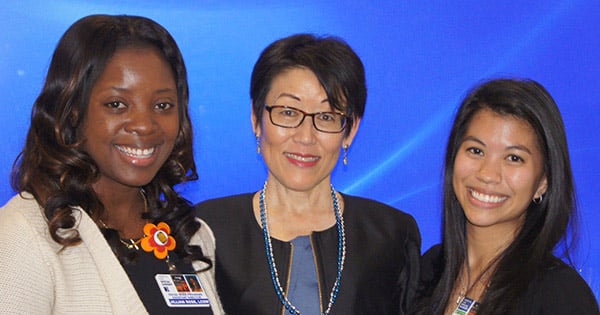LupusLine® Program

LupusLine®, begun in 1988, is the only national telephone peer support program offering one-to-one emotional support and education to people with lupus in the New York tristate region, across the country and internationally. The program links people who need the service with trained volunteers who have lupus.
Following a talk with our professional social worker, callers are individually matched with a trained volunteer, who shares the special understanding of living with lupus or a family member of someone with lupus. New callers are encouraged to contact the Program Manager weekdays between 9am and 5pm EST.
Contact
Jillian Rose, PHD, MPH, LCSW
Chief Health Equity Officer
Community Engagement, Diversity and Research
646.714.6673
rosej@hss.edu
Priscilla Calvache, LCSW
Director for Lupus Programs & Community Engagement
212.606.1952
866.375.1427 (toll-free)
calvachep@hss.edu
What to expect when you call LupusLine®
LupusLine® is ideal for people who want a one-on one relationship via the privacy and convenience offered by phone.
Following a telephone screening our Social Worker will arrange a mutually convenient time, including evening and weekend hours, for you to connect with a LupusLine® peer support counselor from the privacy of your home. LupusLine® is a unique and invaluable resource. We can help with:
- Tools for coping
- Problem-solving
- Understanding symptoms and clarifying medical treatment options
- Doctor-patient communication
- Impact of lupus on work, family and friends
- Pregnancy and parenting issues
- Emotional support
Counselor Stories
Maria-Elena Hodgson – LupusLine® Peer Counselor of 20 years

My name is Maria-Elena Hodgson. In 1987, I was diagnosed with systemic lupus erythematosus and I had kidney involvement. As I desperately tried to find information about lupus at that time, I realized the only information available was either outdated or presented a grim future. I was angered because I did not have the information to help me understand and deal with this illness.
In 1988, I was told about the formation of the Lupus Line. I was excited with the idea because I did not want others to go through the same anguish I was facing. The thought of being able to help others as they faced their lupus diagnosis was truly exciting. Information and an understanding ear were and are the two items necessary to help others as they face a chronic illness. Instantly, I knew I wanted to be a part of this.
Today, here I am 26 years later, still love being a lupus line counselor. Many things changed in my personal life like getting married and having two wonderful children but I still am proud to be a counselor. When I first started, I thought I would be helping others –that was my goal. Today, I see how much being a counselor has helped me become a better listener, more compassionate and simply a better person. Little did I know all that I would gain by simply helping others.
In our members own words
"My counselor was very caring and warm. She was always available to me."
Marilyn, Brooklyn, New York
"LupusLine was fantastic. I learned about my lupus and about how to speak with my doctor more effectively."
Naomi, Whitestone, New York
Get involved!
Jenny Lin: LupusLine® Peer Counselor of 14 years
When I began my training as a LupusLine® counselor, my intention was to help other lupus patients and their families. I wanted to let them know that they were not alone in facing this illness and that if they had any questions or needed help, they could turn to others. I met my expectations. But what came as a surprise to me, was how much I grew as a person and how my life was enriched by my callers, my fellow counselors, my manager, and the LupusLine® staff. Although I fully intended to support and empower others, I found myself in a community that supported and empowered me as well.
I have had the joy and privilege of speaking with many Lupus patients and their families. They came from different ethnic, social, and economic backgrounds. They had so many life stories and perspectives to share. Despite all this diversity, we found common ground in the illness we all faced, the hope and struggle, and the humanity we saw in each other.
Since it began, LupusLine® has received over 20,000 phone calls, offering understanding and insight to people with lupus and their loved ones from around the country. We are always seeking volunteers (ages 18 and older) to help our programs grow. Participants find the training and volunteer experience extremely rewarding.
Before a volunteer becomes a peer counselor, they participate in an extensive training program. They will receive supervision in order to provide exceptional support, a listening ear, and help with problem solving all from the comfort of their own home.
If you live in the New York metropolitan area and would like to get involved we encourage you to contact the Program Manager at 212.606.1952.
Lupus Support Program Summaries
- The Complex Problem of Pain
- Acupuncture for Lupus: Can It Work for You?
- Pulmonary Issues and Lupus
- Who Am I Now? Living With an Autoimmune Disease
- Managing Arthritis in Lupus
- Massage Therapy and Lupus
- The Importance of Clinical Research
- Oral Concerns in People With Lupus
- Lupus, Osteoporosis and Bone Health
- Eye Problems in Lupus
- Vaccinations and Lupus: What You Should Know
- Lupus Blood Test Results Explained
- Possible Environmental Triggers Associated With Autoimmune Diseases
- Nutrition and Lupus: How to Maintain a Healthy Diet
- Lupus and Your Emotions
- Lupus, Sexuality and Intimacy
- Lupus-related Fatigue and Cognitive Dysfunction: The Chicken and the Egg
- How Lupus Affects Multiple Organs
- How People with Lupus Can Build and Maintain Motivation for Healthy Habits
- Lupus and COVID-19: A Q&A Session for the LANtern® (Lupus Asian Network) Lupus Health & Wellness Day
- The Emotional Impact of the Pain Experience
- Lupus Fog – Changes in Memory and Thinking
- Lupus, Vasculitis and Blocked Blood Vessels
- Dealing with Uncertainty in Your Lupus Diagnosis
- How to Communicate with Your Lupus Healthcare Team
- Cutaneous Lupus and Lupus Rashes: What You Need to Know
- Infusion Therapy and Lupus
- Lupus and Fatigue
- Managing Holiday Stress When You Have Lupus
- Getting Exercise and Keeping Physically Fit While Living with Lupus
- Doctor-Patient Communication: Guidelines and Best Practices
- Systemic Lupus Erythematosus (SLE) and Depression
- Heart Health and Chronic Inflammatory Disorders
- Teens with Lupus – and Parents – Get Special Help in Chat Groups

